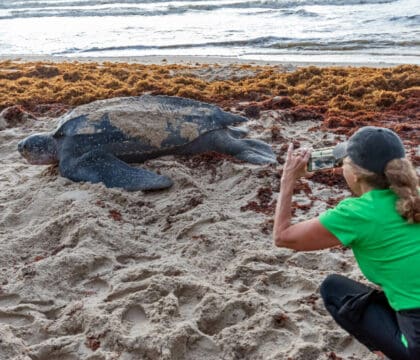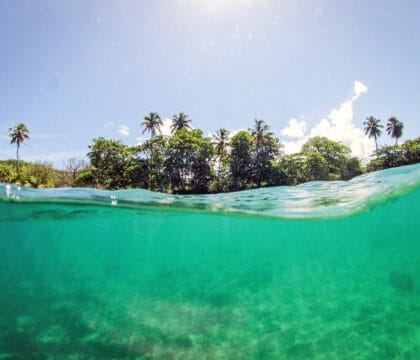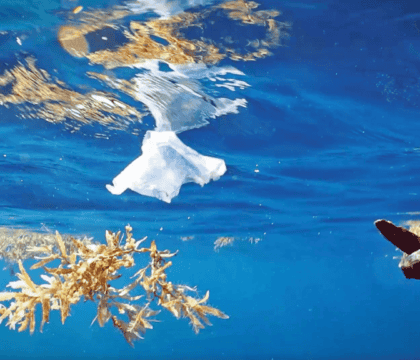May 2, 2018 • Travel Ideas, Trip Reports
As we stepped off the El Aleph, it was hard to believe that in just 12-days we had experienced in-water encounters with pilot whales, swam alongside manta rays, snorkeled some of the most amazing tropical coral reefs on Earth, had an island all to ourselves for an over-the-top beach barbecue, and saw parrots, hornbills, and the Red Bird-of-paradise. To say this was a successful expedition would be an understatement!
The El Aleph at anchor in Raja Ampat. © Wayne Sentman
During the past 8 years that Oceanic Society has been bringing adventure travelers to Raja Ampat, Indonesia, we have truly come to appreciate what an outstanding snorkeling and nature destination it is. In 2018 we wanted to begin offering more intimate, luxurious, and conservation-focused adventures in Raja Ampat and the Coral Triangle, and found the perfect partners to collaborate with toward this goal: El Aleph, a boutique luxury liveaboard with just five cabins and a maximum of 10 guests, and Planet Deep, one of the newest non-profits in the Coral Triangle, focused on leading scientific expeditions to gather critical data in remote regions of the Coral Triangle.
In February 2018 we set out on our maiden voyage aboard the El Aleph with nine Oceanic Society ecotourists and five guides, including explorers and biologists from both Oceanic Society and Planet Deep. Our goals for the expedition were to not only deliver an amazing experience to the participants but also to record data that can help protect the deep water habitats that make up almost 80% of the Coral Triangle ecosystem.
The view in Wayag after a short hike up Mt. Pindito. © Wayne Sentman
We set out from Sorong and spent time in the Dampier Strait, working our way up to the isolated and beautiful lagoons of Wayag in northern Raja Ampat, and then making our way back to Aljui Bay for incredible mangrove snorkeling. From there we continued on to the prolific reefs of Kri and Mansuar, crossing the Dampier Strait once again for a few final nights in Batanta before returning to Sorong for our final evening.
The crew organized a beach barbecue one evening on a private island. © Wayne Sentman
Along the way we had a complete Coral Triangle “safari,” sighting nine species of cetacean including the newly described Omura’s whale. We had quiet, early mornings out in the Zodiac, with the engines off as we looked for seabirds and parrots. We spent four to five hours a day snorkeling in some of the best shallow water reef habitat in the world, where we saw a variety of nudibranchs and countless species of fish and coral. We watched amazing sunsets. And we discussed a variety of conservation topics including plastic pollution, ocean acidification, sea level rise, coral reef ecology, and the value and impacts of rising ecotourism.
During a night snorkel we encountered a squid eating a fusilier. © Wayne Sentman
A colorful Great-billed Parrot. © Wayne Sentman
We also worked closely with the crew of El Aleph to “walk the walk” with regards to sustainability throughout our expedition—providing glass straws instead of plastic ones, waste bin liners made from cassava, and refillable stainless steel water bottles, as well as avoiding all reef fish species at our meals.
I am proud of what we were able to accomplish through our first expedition aboard El Aleph in partnership with Planet Deep, and excited for the new trips we have planned together in 2018 and 2019. I know we have designed an exceptional experience in nature. Our small group size and talented cadre of naturalists combined with the cetacean and plastic monitoring we are able to conduct throughout the trips will not only immerse our travelers in nature, but also allow them to better understand their role in maintaining healthy ocean ecosystems.
For information about upcoming expeditions or charter opportunities aboard El Aleph, please see the following trip pages or get in touch:
Map showing our cruise itinerary




